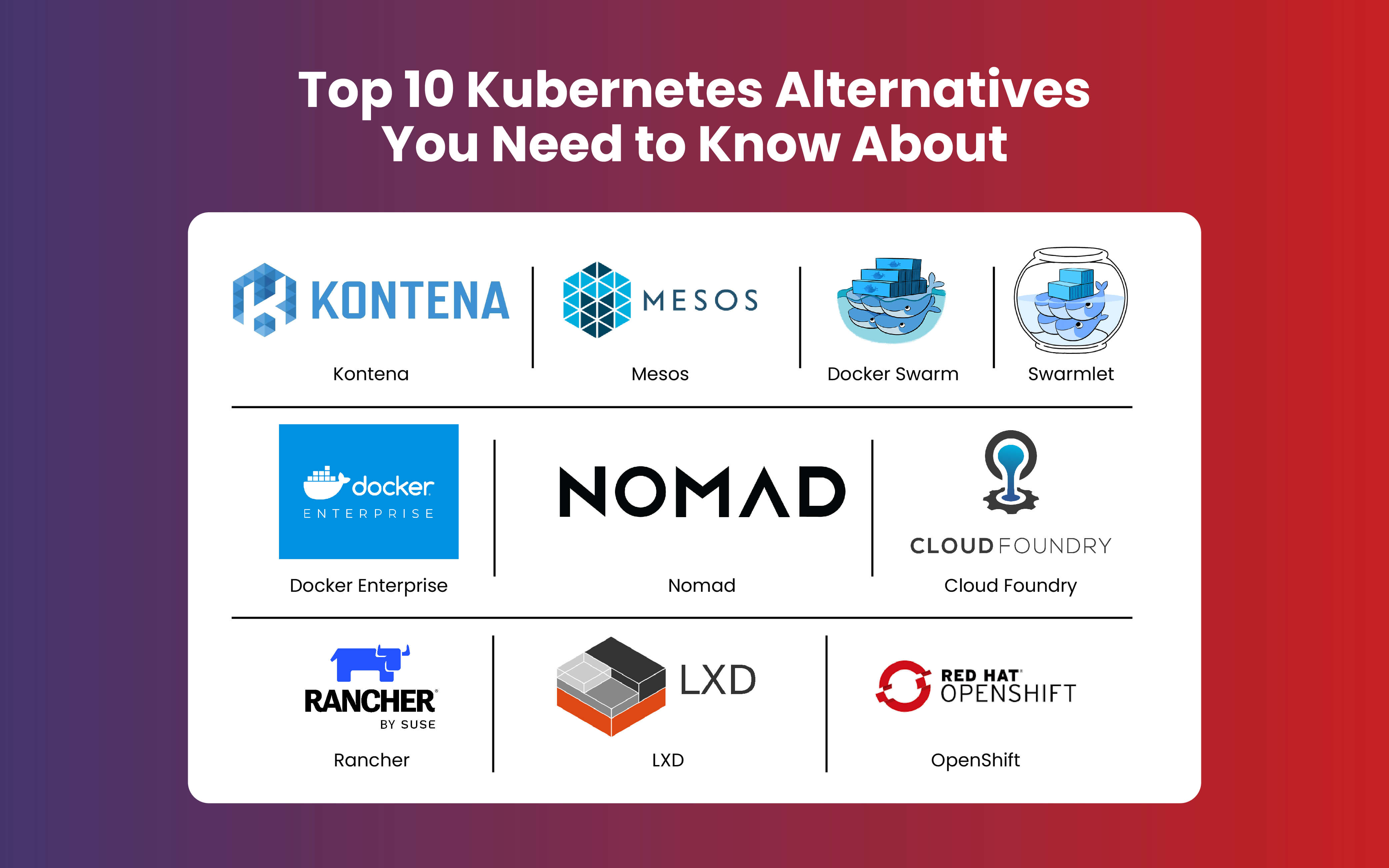Blogs
To know about all things Digitisation and Innovation read our blogs here.
Kubernetes
The Top 10 Kubernetes Alternatives You Need to Know About
SID Global Solutions
7 March 2023

Kubernetes is the most popular container orchestration platform that allows you to manage and deploy containerized applications at scale. However, while Kubernetes is incredibly powerful, it may not always be the best fit for every organization’s needs. There are several Kubernetes alternatives available that offer different features and functionalities, and in this article, we’ll explore the top 10 Kubernetes alternatives that you need to know about.
- Docker Swarm
- Mesos
- Nomad
- OpenShift
- Docker Enterprise
- Rancher
- Cloud Foundry
- Kontena
- Swarmlet
- LXD
Docker Swarm: Docker Swarm is a container orchestration tool that is built into the Docker engine. It allows you to create a swarm of Docker nodes and deploy containerized applications across them. Docker Swarm is a simple and easy-to-use alternative to Kubernetes that can be used to manage small to medium-sized container deployments. It is also compatible with existing Docker tools and workflows, making it a popular choice for Docker users.
Also Read: Digital Skills for Improved Collaboration & Communication in Digital Transformation
Mesos: Apache Mesos is a popular distributed systems kernel that can be used to manage and deploy containers at scale. Mesos provides a highly scalable and fault-tolerant platform for running containerized applications. It allows you to allocate resources across a large cluster of machines and supports multiple container runtimes such as Docker, rkt, and Mesos containers. Mesos is a highly configurable and customizable alternative to Kubernetes that can be used for complex container deployments.
Nomad: Nomad is a container orchestration tool developed by HashiCorp. It provides a simple and easy-to-use platform for deploying and managing containerized applications at scale. Nomad supports multiple container runtimes such as Docker and rkt and allows you to run jobs on any machine in your cluster. Nomad also supports dynamic scaling, auto-rebalancing, and automatic task scheduling, making it an ideal alternative to Kubernetes for organizations looking for a simple and easy-to-use container orchestration platform.
OpenShift: OpenShift is a container application platform developed by Red Hat. It provides a complete platform for developing, deploying, and managing containerized applications. OpenShift is built on top of Kubernetes but provides additional features such as integrated CI/CD pipelines, application lifecycle management, and automated operations. OpenShift also supports multiple container runtimes such as Docker and CRI-O, making it a versatile and powerful alternative to Kubernetes.
Docker Enterprise: Docker Enterprise is an enterprise-grade container platform that provides a complete solution for building, shipping, and running containerized applications. It includes a private registry, image scanning, and vulnerability assessment, as well as a secure Kubernetes alternative that supports Docker Swarm. Docker Enterprise also provides integrated security features such as role-based access control and image signing, making it a secure and robust alternative to Kubernetes for enterprise organizations.
Rancher: Rancher is a complete container management platform that provides a simple and easy-to-use alternative to Kubernetes. It includes a container orchestration engine, a private registry, and a user-friendly management interface. Rancher supports multiple container runtimes such as Docker and CRI-O and provides a centralized platform for managing containerized applications across multiple clusters. Rancher also supports multi-cloud deployments, making it an ideal choice for organizations that need to manage containerized applications across multiple cloud providers.
Also Read: Digital Transformation: How a Modern Tech Stack Can Drive Success?
Cloud Foundry: Cloud Foundry is an open-source platform-as-a-service (PaaS) that provides a complete platform for deploying and managing containerized applications. It includes a container runtime, a buildpack system, and a user-friendly management interface. Cloud Foundry supports multiple container runtimes such as Docker and Garden, and provides a simple and easy-to-use alternative to Kubernetes for organizations that need to deploy and manage containerized applications in a PaaS environment.
Kontena: Kontena is a modern container orchestration platform that provides a simple and easy-to-use alternative to Kubernetes. It includes a container orchestration engine, a private registry , and a user-friendly management interface. Kontena supports multiple container runtimes such as Docker and rkt and provides a centralized platform for managing containerized applications across multiple clusters. It also includes integrated security features such as role-based access control and image signing, making it a secure and robust alternative to Kubernetes for organizations looking for a modern container orchestration platform.
Swarmlet: Swarmlet is a lightweight container orchestration platform that provides a simple and easy-to-use alternative to Kubernetes. It is built on top of Docker Swarm and provides a user-friendly management interface for deploying and managing containerized applications. Swarmlet is designed to be lightweight and easy to install, making it an ideal choice for organizations that need a simple and efficient container orchestration platform.
LXD: LXD is a container hypervisor that provides a lightweight and efficient alternative to traditional virtual machines. It allows you to run multiple containers on a single host while providing the same level of isolation and security as traditional virtual machines. LXD also supports live migration, making it easy to move containers between hosts. While LXD is not a container orchestration platform like Kubernetes, it can be used in conjunction with other tools such as Docker Swarm or Mesos to provide a complete container orchestration solution.








